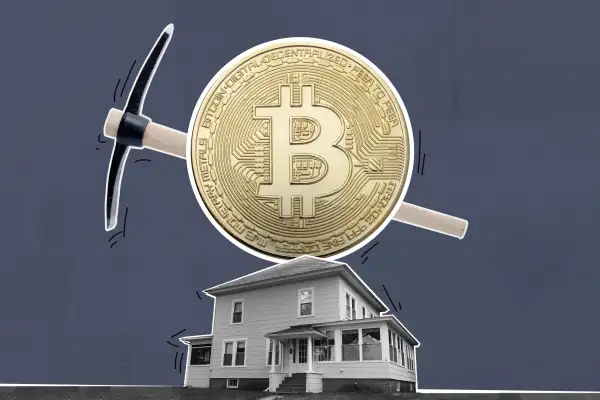It Just Got Easier to Mine Bitcoin at Home
Money is not a client of any investment adviser featured on this page. The information provided on this page is for educational purposes only and is not intended as investment advice. Money does not offer advisory services.

Want to sit in your pajamas, drink your coffee and mine some bitcoin from your bedroom? Well, you can.
Compass Mining, which sells bitcoin mining equipment and services, announced this week that it's launching a direct-to-consumer mining service, allowing miners to set up shop in their own homes.
Cryptocurrency enthusiasts used to be able to mine bitcoin on their own laptops from their houses and apartments. But around 2012, mining machines burst onto the scene and the industry boomed. Large firms were able to mine with thousands of machines, leaving individual miners with high hardware costs and less of an opportunity to actually mine any bitcoin.
Now, Compass Mining says it's "bringing bitcoin mining back to its roots" by allowing miners to buy a single application-specific integrated circuit (ASIC), which is the equipment used to mine bitcoin and other cryptocurrencies, instead of having to buy in bulk. Prices for individual machines start at $8,100.
Sure, being able to create money at home might seem magical — Bitcoin is worth over $40,000 per coin right now, even after a recent decline. But mining for bitcoin doesn't equate to snapping your fingers and getting bitcoin, and it certainly has risks.
What is bitcoin mining?
Bitcoin mining is how new bitcoins are created, and it involves solving a complicated math problem. Or, at least, your computer solving a complicated math problem.
Computers attempting to mine bitcoin run a program that is essentially a trial-and-error algorithm, performing millions of calculations to solve the computational puzzle.
If you're successful, you get what's called a "block reward," or a fixed number of new bitcoins (BTC). One block equals 6.25 BTC, but the rewards are halved after every 210,000 blocks, or about every 4 years. This was part of Bitcoin's design to ensure that a maximum of only 21 million bitcoins are created (currently, there are nearly 19 million in circulation).
What are the risks of mining bitcoin?
It might seem like mining bitcoin would automatically mean you're making money out of thin air, but that's not the case — especially not when you factor all of the costs involved.
“At-home mining is not economical," says Hanna Halaburda, an associate professor at NYU Stern School of Business.
Blocks are mined every 10 minutes on average, but you're competing with essentially every other miner out there, and many of them — like large firms — have a lot more computational power, she adds. It's very rare to actually mine a block reward, and, even if you get lucky and do, you probably won't be able to accomplish it again as your equipment quickly becomes outdated. (This is why many miners participate in mining pools, in which everyone in the pool agrees to split the cryptocurrency mined no matter actually who mined it.)
And miners can expect a very high electricity bill. In 2009, it took just a few seconds worth of household electricity to mine one bitcoin and now, it takes nine years worth, which comes out to a bill of about $12,500, according to The New York Times. (Another way to see it: the Bitcoin network's electricity consumption is about the same as Washington state's yearly usage.)
The mining hardware itself isn't cheap either, and while large firms are sometimes buying thousands of machines at once, individual miners may pay a premium if they’re buying one or even five. Compass Mining's hardware starts at $8,100 and goes up to $10,400. (Those prices are in line with what large firms pay for each machine, so Compass customers who buy the at-home machines won’t actually be paying a premium, says Zack Voell, research director at Compass Mining.)
So while machines may be more affordable and readily available to retail miners than they were before, making money by mining bitcoin is still a long shot — and you could spend a lot of money in the process.
Plus, bitcoin mining machines are hot and loud. Warn your roommate.
More from Money
Diversification Is the Key to Investing in Stocks and Bonds. Here's Why It Can Work for Crypto, Too
What Is the 'Golden Cross,' and Why Are Bitcoin Investors Obsessed With It?
Here's Why Financial Advisors Won't Recommend Cryptocurrencies — Even if They'd Like to

